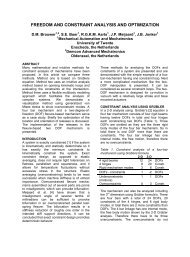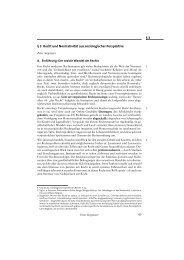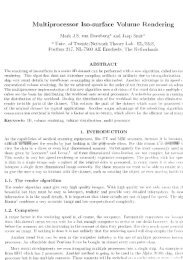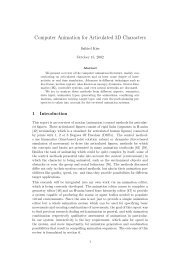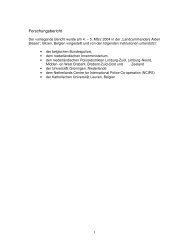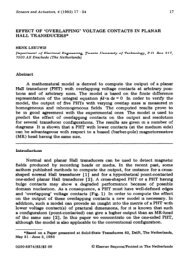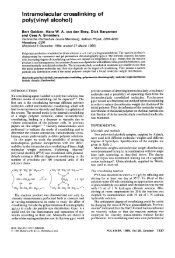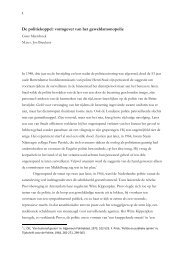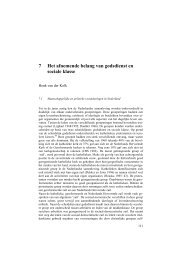Innovation and institutional change: the transition to a sustainable ...
Innovation and institutional change: the transition to a sustainable ...
Innovation and institutional change: the transition to a sustainable ...
Create successful ePaper yourself
Turn your PDF publications into a flip-book with our unique Google optimized e-Paper software.
14 Chapter 2<br />
emerges because of <strong>change</strong>s in human behaviour, interaction <strong>and</strong> practice.<br />
Max Weber conceptualises this with <strong>the</strong> building blocks ‘social action’ <strong>and</strong><br />
‘order’. Action is behaviour invested with meaning, <strong>and</strong> <strong>the</strong> prefix social<br />
implies action is oriented <strong>to</strong> ano<strong>the</strong>r ac<strong>to</strong>r 1 (Smelser <strong>and</strong> Swedberg, 2005: 9).<br />
Order comes in<strong>to</strong> being “when social actions are repeated over a period,<br />
regarded as objective, <strong>and</strong> surrounded by various sanctions” (Smelser <strong>and</strong><br />
Swedberg, 2005: 9). In his classical ‘The Protestant Ethic <strong>and</strong> <strong>the</strong> Spirit of<br />
Capitalism’, Weber pointed at <strong>the</strong> link between patterns of behaviour<br />
ingrained by Protestantism <strong>and</strong> <strong>the</strong> advance of modern Western industrial<br />
economy (L<strong>and</strong>es, 1969: 22-23; Castells, 1996: 210-215). The relevance lies<br />
in <strong>the</strong> general argument that cultural <strong>and</strong> <strong>institutional</strong> transformation brought<br />
forth a new paradigm of economic organisation <strong>and</strong> <strong>the</strong> necessary ethical<br />
foundation for pure individual profit-seeking (Castells, 1996: 211, 213).<br />
Also Beck (1992: 201) points out that Weber argued that “work,<br />
technological <strong>change</strong> <strong>and</strong> economic development are tied in<strong>to</strong> <strong>the</strong> system of<br />
cultural norms, <strong>the</strong> prevailing expectations <strong>and</strong> <strong>the</strong> value orientations of<br />
people”. Sociologists also criticise basic premises regarding rational<br />
behaviour of ac<strong>to</strong>rs utilised in mainstream economics. Simon stressed <strong>the</strong><br />
bounded rationality of human behaviour due <strong>to</strong> limits of individual cognitive<br />
capacity <strong>and</strong> March <strong>and</strong> Simon argue how an individuals’ actions are<br />
strongly conditioned by <strong>the</strong> organisation which <strong>the</strong>y are a part of (Scott,<br />
2001: 26). Parsons (1982) explained how systems of norms regulate <strong>the</strong><br />
interaction of humans, <strong>and</strong> Berger <strong>and</strong> Luckmann (1966) focus more on<br />
cognitive aspects <strong>and</strong> argue that reality is a product of social interaction<br />
based on <strong>the</strong> formation of shared knowledge <strong>and</strong> belief systems which guide<br />
human behaviour. More broadly speaking, <strong>the</strong> notion of institutions is used<br />
<strong>to</strong> capture <strong>the</strong> way human behaviour <strong>and</strong> interaction is enabled, guided,<br />
constrained <strong>and</strong> regulated by various types of rules (Scott, 2001). Institutions<br />
have taken a central place in a variety of approaches from different academic<br />
disciplines. Consequently, <strong>the</strong>re is a wide divergence of definitions regarding<br />
institutions <strong>and</strong> in ways <strong>to</strong> study <strong>the</strong>m. Table 2.1 introduces three main<br />
pillars in <strong>the</strong> nature of institutions, based on Scott (2001). The regulative<br />
pillar is broadly accepted: institutions regulate <strong>and</strong> constrain behaviour.<br />
Economists predominantly draw on this pillar in <strong>the</strong> way <strong>the</strong>y integrate<br />
institutions in<strong>to</strong> economic reasoning (e.g. Williamson, 1981 <strong>and</strong> North,<br />
1990). In <strong>the</strong> normative pillar behaviour is conditioned by social beliefs <strong>and</strong><br />
norms. Early sociologists such as Parsons <strong>and</strong> Durkheim see institutions as<br />
resting mainly on this pillar (Scott, 2001: 55-56). The cognitive pillar of<br />
1 With <strong>the</strong> focus on individual action <strong>and</strong> its relation <strong>to</strong> o<strong>the</strong>r ac<strong>to</strong>rs Weber distinguishes<br />
himself from micro-economics where individual action is seen as unconnected <strong>to</strong> o<strong>the</strong>r<br />
individuals (Smelser <strong>and</strong> Swedberg, 2005: 4).



